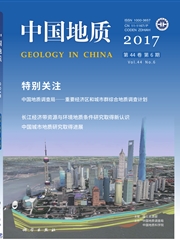

 中文摘要:
中文摘要:
通过锆石-磷灰石裂变径迹年龄分布及其与粗碎屑沉积建造和地层不整合关系的综合分析,提供了鄂尔多斯盆地中新生代构造事件的年代学约束及其沉积响应特点。印支期构造事件主要发生在230~190Ma。包含215Ma和195Ma两个峰值年龄,在盆地西南缘发育晚三叠世粗碎屑类磨拉石建造及其与上覆地层的平行不整合。燕山期构造事件主要发生在燕山中晚期的150~85Ma,包含145Ma、120Ma和95Ma等3个峰值年龄,在盆地西南缘发育燕山中期的晚侏罗世和早白垩世的粗碎屑类磨拉石建造及其地层间的角度不整合。喜山期构造事件主要表现为盆地区域的多旋回构造隆升。至少包含55Ma、25Ma和5Ma等3个幕次的峰值年龄事件。其中,锆石和磷灰石叠合分布的峰值年龄(145Ma)和其相关的角度不整合、逆冲推覆和区域岩浆活动等,共同指示了鄂尔多斯盆地中新生代的一次关键构造变革事件。
 英文摘要:
英文摘要:
An integrated analysis of the distribution of the apatite and zircon fission track ages and its relation to coarse clastic sediments and stratigraphic unconformity provides the chronological constraint on the Meso- Cenozoic tectonic events and their sedimentary response in the Ordos basin. The Indosinian tectonic event mainly occurred at 230-190 Ma with two statistic peak ages (195 and 215 Ma). On the southwestern margin of the basin there occur Late Triassic coarse clastic molasse-like deposits, which have a disconformable contact with the overlying strata. The Yanshanian tectonic event mainly occurred at 150-85 Ma with three statistic peak ages (145, 120 and 95 Ma) in the mid-late Yanshanian. On the southwestern margin of the basin there occur middle Yanshanian Late Triassic and Early Cretaceous coarse clastic molasse-like deposits and angular unconformity. The Himalayan tectonic event is mainly marked by polycyclic tectonic uplift of the basin at a regional scale, including at least three statistic peak age events at 55, 25 and 5 Ma respectively. The peak age of 145 Ma offered by zircon and apatite fission tracks and its related angular unconformity, overthrusting and regional magmatic activity all indicate a key Meso-Cenozoic tectonic reworking event in the Ordos basin.
 同期刊论文项目
同期刊论文项目
 同项目期刊论文
同项目期刊论文
 期刊信息
期刊信息
